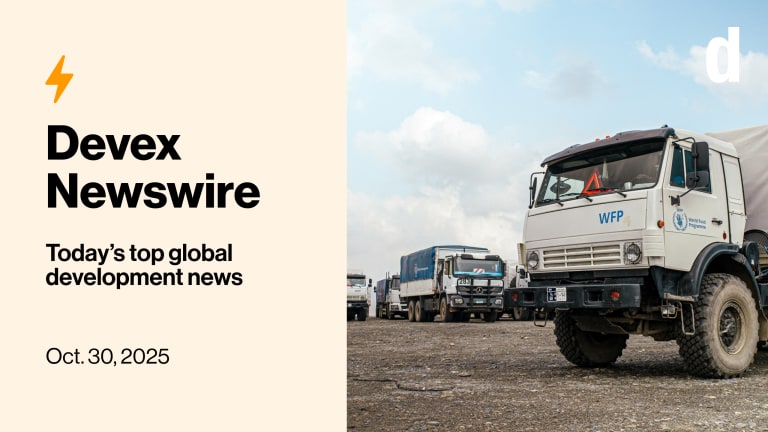
Sudan has a new regime — but international NGOs are experiencing familiar shakedown tactics, according to exclusive Devex reporting.
This is a preview of Newswire
Sign up to this newsletter for an inside look at the biggest stories in global development, in your inbox daily.
Nearly half the population of Sudan is expected to need humanitarian aid due to food insecurity this year. But that’s made harder by what aid workers, experts, and U.N. agencies say is a pattern of government officials piling on bureaucratic fees and interfering in procurements.
There was a respite for development agencies after the fall of former military ruler Omar al-Bashir last year, but hopes of an easier environment for NGOs working in Sudan have been reversing since the military took over in October, sparking a pause in some international aid,” Mat Nashed reports for Devex.
The complaints center around new fees which have emerged amid a spiraling economic crisis, from which civil servants are not exempt. Some aid organizations are reluctant to reject new funding requests since they could lose vital access or be kicked out of the country, a source tells Mat.
Some are openly calling for a united front from the international community and development agencies to confront corruption in the country.
“There will be a need for major relief operations in the coming months, and therefore, this is the time for humanitarian agencies to speak out about these corrupt practices and denounce them,” said Suliman Baldo, a Sudanese expert on humanitarian affairs. “They must push the government to act fairly.”
Exclusive: Sudanese authorities accused of INGO cash shakedown amid aid freeze
Development with a twist
A new reason to deploy economic development programming emerged on Thursday after the U.K. government announced a £120 million ($157 million) project as part of a controversial deportation scheme for migrants.
The Economic Transformation and Integration Fund will “support programs to improve the lives of people in Rwanda, and develop the country, economy, job prospects and opportunities,” Home Secretary Priti Patel said at a press conference in Kigali. The U.K. would “provide funding and expertise to implement this agreement," she added.
But little further detail has been given on what the program will actually entail, how many people it will target, or even when it will begin, aside from a few lines in a Home Office blog. It said the program would “enhance economic prosperity in the region by investing in upskilling, development and projects which will benefit both migrants and their hosts.”
Despite the rhetoric surrounding the fund having all the hallmarks of a classic aid funded program, when asked if official development assistance would be funding it, the Home Office insisted “it’s not– it [is] new funding that comes from the Treasury.” That said, the Treasury allocates all funding across government, including to the aid budget, from which the Home Office enjoyed £915 million last year. Devex is awaiting further clarification.
The U.K.-Rwanda Migration and Economic Development Partnership plans the transportation of irregular migrants to the U.K., particularly those crossing the channel in small boats, to Rwanda, where they will be held and processed. If found to be genuine refugees, they will gain the right to stay in Rwanda, and not return to the U.K. Flights could begin as soon as May, according to reports. It was immediately controversial, and even managed to draw a strong and relatively swift condemnation from the United Nations.
These arrangements simply shift asylum responsibilities, evade international obligations, and are contrary to the letter and spirit of the Refugee Convention,” continues Gillian Triggs, assistant high commissioner for Protection at UNHCR, in her tweet thread.
Read: UK to fund Rwanda economic development alongside migrant deportation
+ The European Commission has a 12-country regional plan to address migration to Europe via the Atlantic and western Mediterranean. Devex Pro subscribers can read the report. Not yet a Pro subscriber? Sign up now and start your 15-day free trial.
Oversupply
There is a “very, very high” risk that a major facility for manufacturing Johnson & Johnson’s COVID-19 vaccines in South Africa could close as a result of a lack of orders from African countries.
That’s the assessment of Dr. John Nkengasong, the director of the Africa Centres for Disease Control and Prevention, Paul Adepoju reports for Devex. But that outcome, Nkengasong says, cannot and must not be allowed to happen.
Building Africa’s capacity to produce its own vaccines, as well as diagnostics and therapeutics, has been viewed by many global health experts as critical to controlling the pandemic. But an increase in the supply of COVID-19 vaccines has closed the access gap that Aspen Pharmacare was meant to fill, according to Nkengasong. He called for deliberate action to safeguard Africa’s vaccine-manufacturing industry.
Read: Lack of orders could halt COVID-19 vaccine production in South Africa
+ For more content like this, sign up for Devex CheckUp, the must-read weekly newsletter for exclusive global health news and insider insights.
Let’s get together
Next week, the World Bank and International Monetary Fund will hold their annual Spring Meetings in Washington, D.C. My colleague Shabtai Gold has an analysis of the issues that will be dominating the discussion: war in Ukraine and the attendant food crisis, of course, but also a potential debt deal … oh, and the pandemic.
Read the full rundown: What to watch at the Spring Meetings
In other news
Negotiations over the TRIPS waiver are down to the “last few tweaks,” according to WTO Director-General Ngozi Okonjo-Iweala. [Reuters]
Tonga's rebuilding is slowly progressing three months after a historic eruption that affected 80% of the island nation's population. [AP]
WHO warns against thinking that COVID-19 is subsiding. [Al Jazeera]
Sign up to Newswire for an inside look at the biggest stories in global development.








